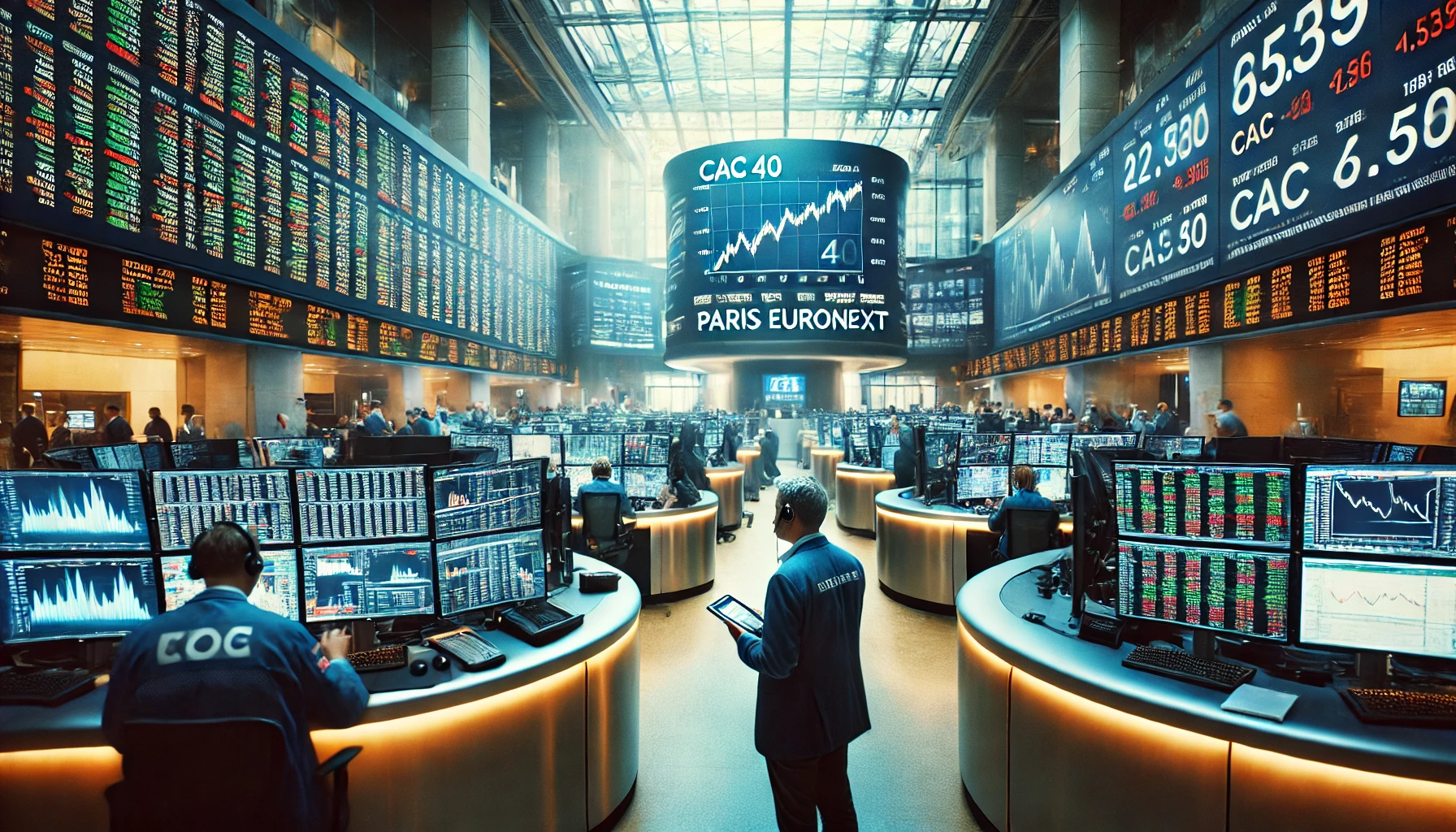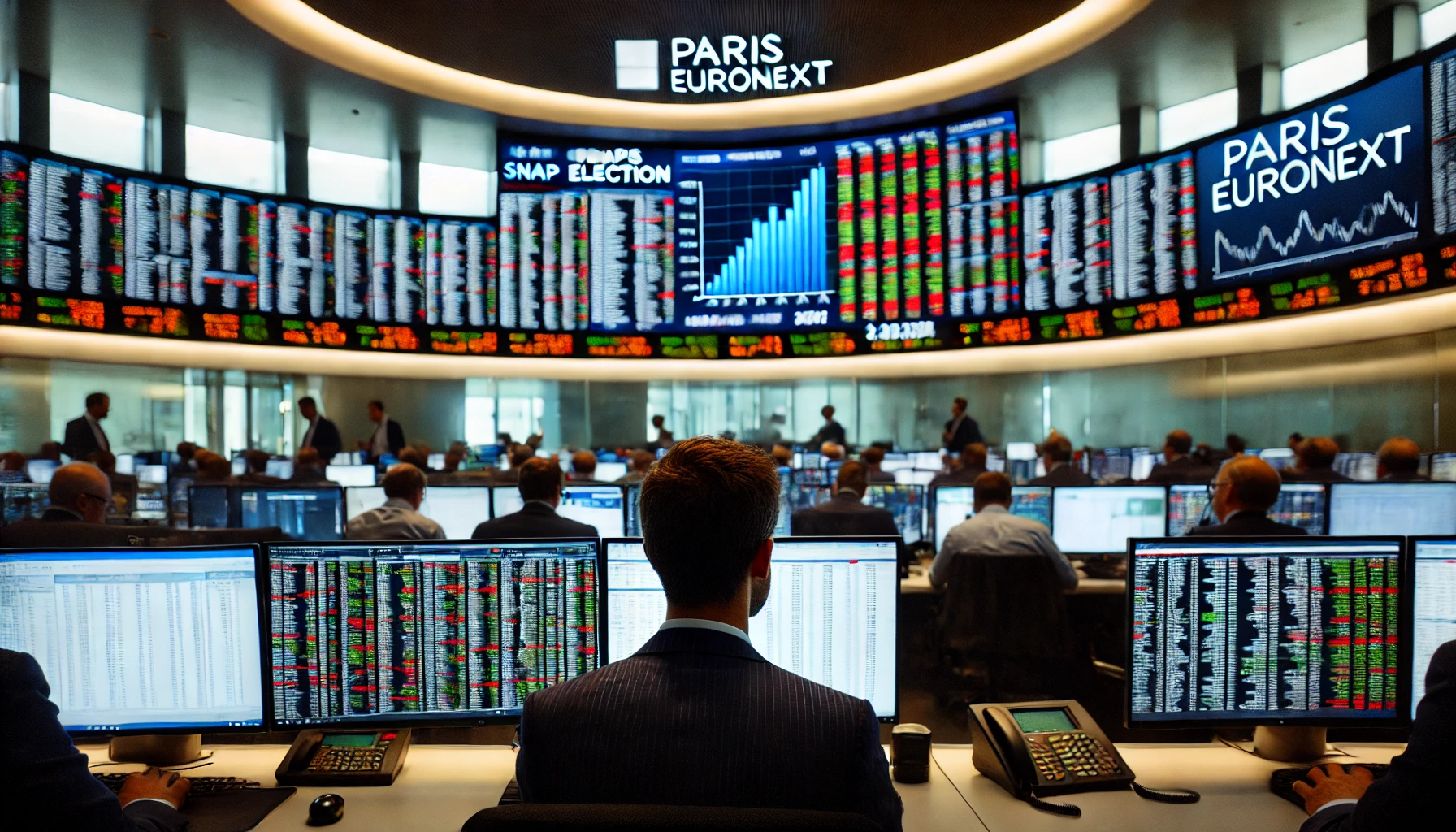 French Stocks Rally as Far-Right Takes Lead in Snap Election
French Stocks Rally as Far-Right Takes Lead in Snap Election
In a significant development for the French financial markets, the country’s benchmark CAC 40 index saw a notable rise following the initial round of the snap election. This reaction comes amid mounting expectations of a hung parliament, a scenario that many investors view as the “least bad” outcome for market stability.
Relief Rally Amid Political Uncertainty
On Monday morning, French stocks experienced a relief rally, with the CAC 40 index climbing 2.2% by 8:47 a.m. London time. This upward movement was driven by the initial results of the snap election, which indicated a potential hung parliament. By mid-morning, the CAC 40 index was up by 1.3%, reflecting a moderate retreat from its earlier peak of over 2.5%.
Sebastian Paris Horvitz, director of research at La Banque Postale Asset Management, highlighted the market’s reaction, explaining that the election outcomes largely reaffirmed pre-existing expectations, with a hung parliament remaining the most likely scenario. From a market perspective, this outcome is seen as less detrimental compared to other possibilities, although it is far from ideal. The usual scenario involves having a majority to govern France, but after the second round, there might not be such a majority, raising questions about how France will be governed.
Election Results and Market Reaction
The snap election’s first round results revealed a fragmented political landscape. The far-right National Rally party and its allies secured 33.1% of the vote, the left-wing NFP alliance garnered 28%, and President Macron’s coalition obtained 20%, according to France’s Interior Ministry.
Economists from Citi and other institutions had previously warned that an outright victory for either the far-right or the leftist alliance could trigger severe market volatility due to their proposed tax and spending policies. Such an outcome could potentially lead to a debt crisis. However, the likelihood of a hung parliament has provided some reassurance to the markets.
Matthew Ryan, head of market strategy at financial services firm Ebury, noted that a hung parliament would likely be viewed as a positive development for European assets, as markets would anticipate policies on tax and immigration that closely resemble the status quo. Despite the far-right’s strong performance in the first round, the possibility of a National Rally majority could limit gains in the euro in the coming days.
Intense trading at Paris Euronext during the snap election with traders monitoring stock data and results.

Looking Ahead: The Second Round and Its Implications
The second round of voting is scheduled for July 7. To achieve a majority, the National Rally needs to secure 289 out of 577 seats in the National Assembly. Current candidates have until Tuesday evening to confirm their participation in the final round. In a strategic move to curb far-right gains, some left-wing and centrist candidates who placed third in their local races are expected to withdraw to avoid splitting the vote.
A crucial question remains regarding the next Prime Minister. The position is currently held by Gabriel Attal, an ally of President Macron. The National Rally is pushing for its 28-year-old leader, Jordan Bardella, to take the role. If Bardella succeeds, it would result in a “cohabitation” scenario where the President and Prime Minister hail from opposing political factions.
Impact on French Reforms and Economic Outlook
Even if a hung parliament materializes, the French Constitution ensures the continuity of the current budget, thereby stabilizing essential areas such as pension payments. However, the lack of a clear majority could stall significant reforms. Horvitz emphasized the challenges ahead, noting the critical time for Europe as it deals with defense threats, the energy transition, and weak economic growth in France and Germany.
The bond market has already reacted to the political uncertainty. French 10-year bond yields reached their highest level since November 2023 on Monday, trading around 3.334%. The spread between French and German bond yields, which had widened significantly since the election was called, narrowed slightly after hitting a 12-year high on Friday. Elevated borrowing costs are expected to continue putting pressure on assets linked to bonds, including bank stocks and utilities.
Market Implications Moving Forward
The French stock market’s response to the snap election underscores the intricate relationship between political developments and financial stability. As the second round of voting approaches, investors will closely monitor the potential formation of a hung parliament and its implications for policy continuity and economic reform. The market’s cautious optimism reflects a preference for the status quo amid broader uncertainties in the European political and economic landscape.
This comprehensive analysis of the current situation in France’s financial markets and the potential implications of the snap election is designed to provide a clear and informative overview for a global audience. By focusing on the key events and their impact, this article aims to deliver valuable insights for investors and stakeholders.












